Why Did My Cat Throw Up? 7 Vet-Reviewed Reasons
Updated on
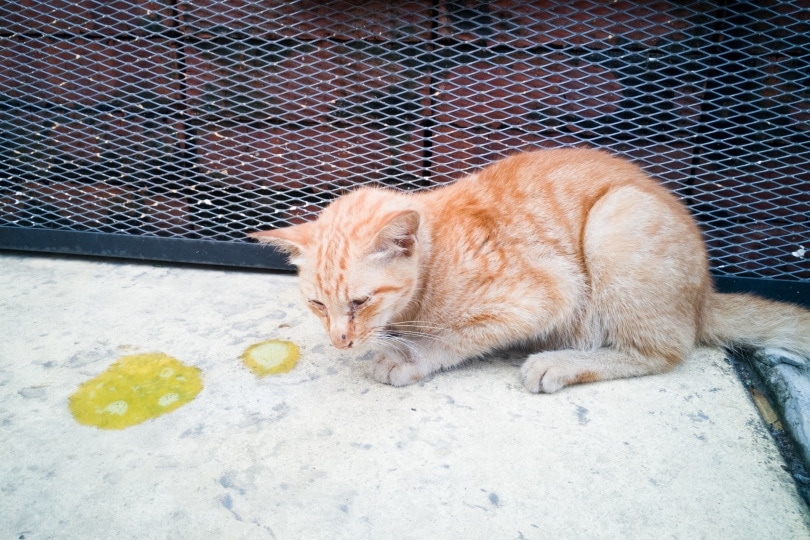
As a cat parent, hearing the familiar gagging of your cat throwing up somewhere in the house puts you on instant alert. Finding random vomit or hairballs in your humble abode isn’t fun. It’s also not the easiest thing to clean up. While many cat owners interpret feline vomiting to be largely explained by dealing with hairballs, this isn’t always the case. Let’s take a look at seven possible reasons your cat may be throwing up so you can take the right actions to make them feel better.
Top 7 Reasons Cats Throw Up
1. Hairballs
Cat owners are not unaccustomed to finding hairballs vomited around the home. This is due to a cat’s strict grooming habits and how their very rough tongues pull loose hairs during this process. When all this loose hair builds up in their stomachs, it has to go somewhere. Unfortunately, that somewhere is usually your floor. Normally, hairballs are nothing to worry about but if you feel this is happening more frequently than it should, reach out to your veterinarian. Hairballs can be indicators of other issues.
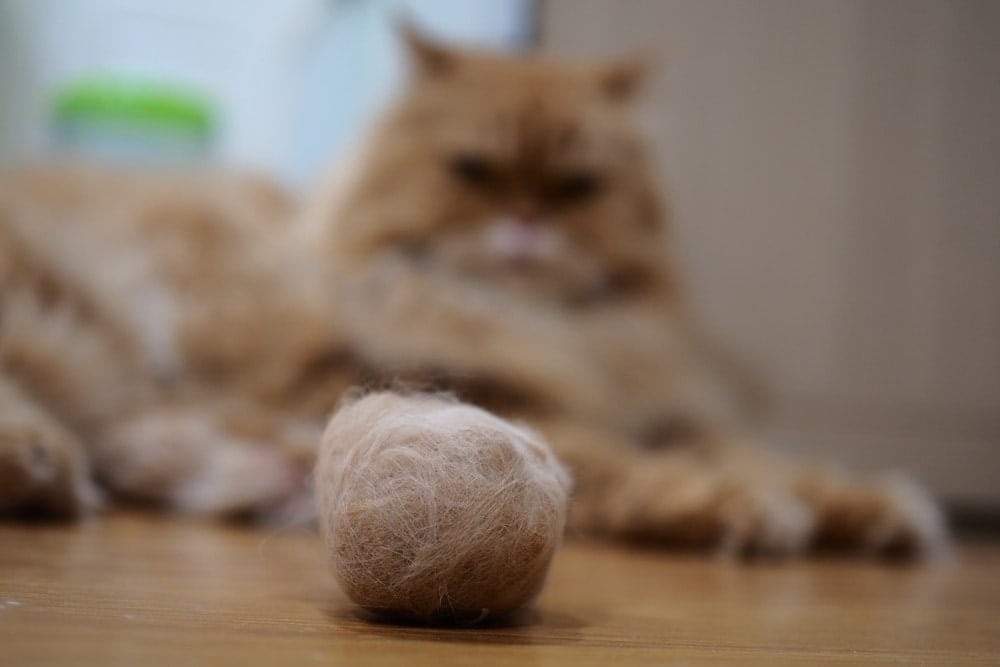
Having a pet means cleaning up smells, stains, hair, vomit, and more...and you can add to your pet clean-up routine with the Hepper Advanced Bio-Enzyme Pet Stain & Odor Eliminator Spray.
- ADVANCED ENZYMATIC CLEANER - Penetrates the most stubborn smells and stains at the deepest molecular...
- FOR ANY MESS, ON ANY SURFACE - This pet odor eliminator cleans your carpets, floors, furniture,...
It's our product, and we love it so much, we just have to share! It permanently removes the very worst smells and stains, and we offer a 100% satisfaction guarantee!
2. Gastroenteritis
Gastroenteritis, or upset stomach, is common in cats. Toxins, medications, and even dietary issues can lead to gastroenteritis. Luckily, if your cat suffers from this, it can resolve on its own. However, if an upset stomach continues, and switching your cat’s food or other small changes do not help, your cat may need a trip to the veterinarian for a checkup.
3. Obstructions and Foreign Bodies
Like other pets, cats are known to eat things they shouldn’t. While they play with a random string, toy, or even a hairband, they can possibly swallow it. Once these foreign bodies make their way into your cat’s GI tract, they may experience vomiting. If you don’t see the object reappear in the vomit, your cat must go to the veterinarian immediately. Foreign objects can cause intestinal obstructions which can be quite dangerous for your kitty.
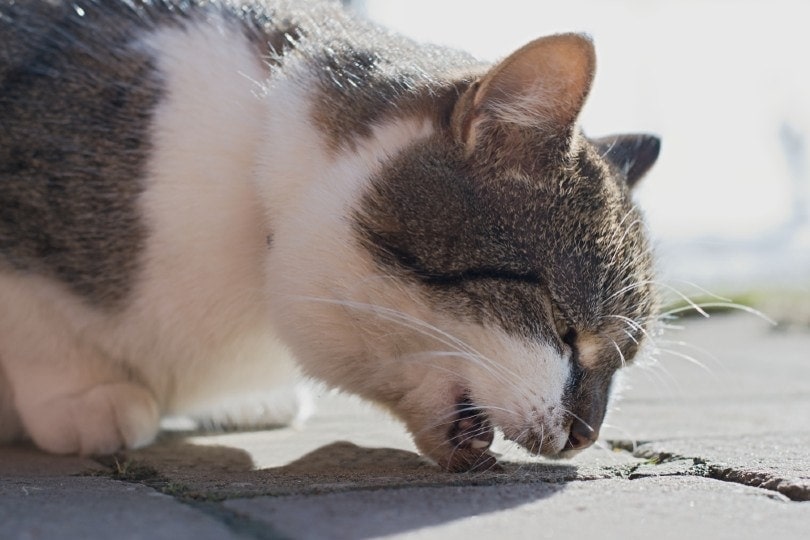
4. Food Allergies
Another common ailment for cats is food allergies. This happens when certain foods irritate their stomachs. If you are unaware of a food allergy they may be suffering from, when they try new foods, you might see signs like vomiting and diarrhea. If at all possible, it is best to avoid triggering foods that may upset your cat’s digestive tract to keep them healthy and avoid unnecessary vomiting.
5. Illnesses
Pancreatitis, kidney disease, and hyperthyroidism are all chronic illnesses that may upset your cat’s digestive system and make them vomit. Discovering these types of illnesses requires a veterinarian. Once the underlying cause is determined, your veterinarian will work out proper treatments, which may include medications, to help you better manage your cat’s lifetime illness.
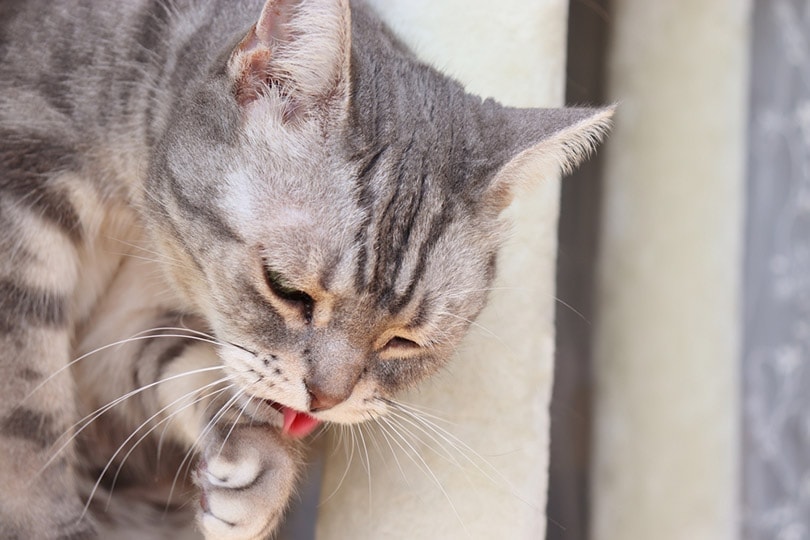
6. Parasites
Worms are common in dogs and cats, and they can suffer from them at different times in their lives. Normally, worms present themselves in kittens, but this isn’t always the case. If your cat is suffering from these parasites, it can cause vomiting. Luckily, the worms are often present in your kitty’s bile or in their stool to help you determine if this is the issue. If you see these signs, proper medication can rid your feline of the parasites and stop unwanted vomiting.
7. Cancer
Hearing that your cat is being diagnosed with cancer is a hard pill to swallow. One of the symptoms that may alert you to this issue is vomiting. If you find that your cat is vomiting and you can’t pinpoint the cause, a trip to the vet is necessary. With the various types of cancers cats experience, vomiting can be a symptom. It is important to seek out the proper treatments and help your kitty lead the best life possible.
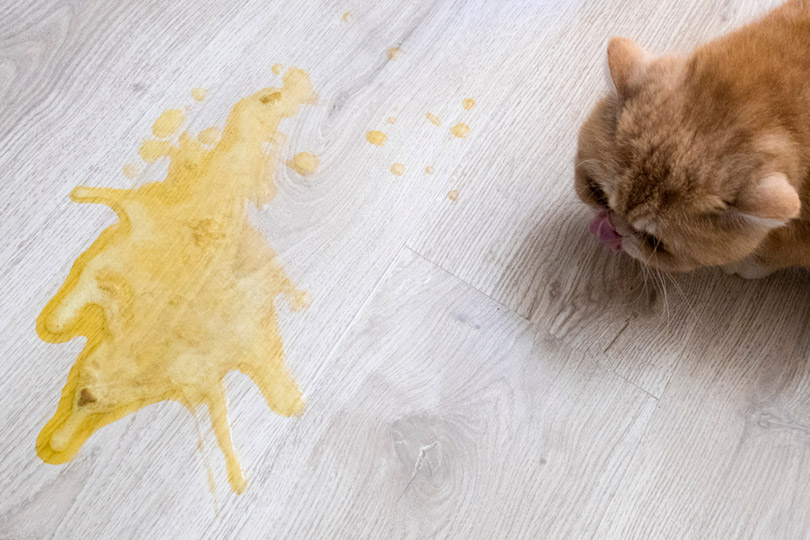
How to Know When There’s a Problem
Most of us who’ve been around cats our entire lives have become accustomed to random hairballs popping up around the house. Unfortunately, this also causes us to overlook when potentially dangerous problems are happening.
- Blood
- Bile
- Partially digested food
- Mucus
You may also notice other symptoms that your cat is suffering from. If they are vomiting and showing other signs, it is best to reach out for medical treatment.
- Lethargy
- Fever
- Loss of appetite
- Diarrhea
- Changes in litter box activity
If your cat’s vomiting becomes too frequent, has other fluids or materials mixed in, or is accompanied by other symptoms, scheduling an appointment with your veterinarian is in order.
Conclusion
As you can see, there are several reasons your cat may be throwing up around the house. If this is happening more often than you are comfortable with, or you see clear signs of distress in your kitty, reaching out to your cat’s veterinarian can make all the difference in the world. Often, illnesses, even the more serious ones, can be managed if caught in time. So make sure to pay close attention so you can address any issues, and continue to keep them happy and healthy.
Featured Image Credit: ThamKC, Shutterstock














